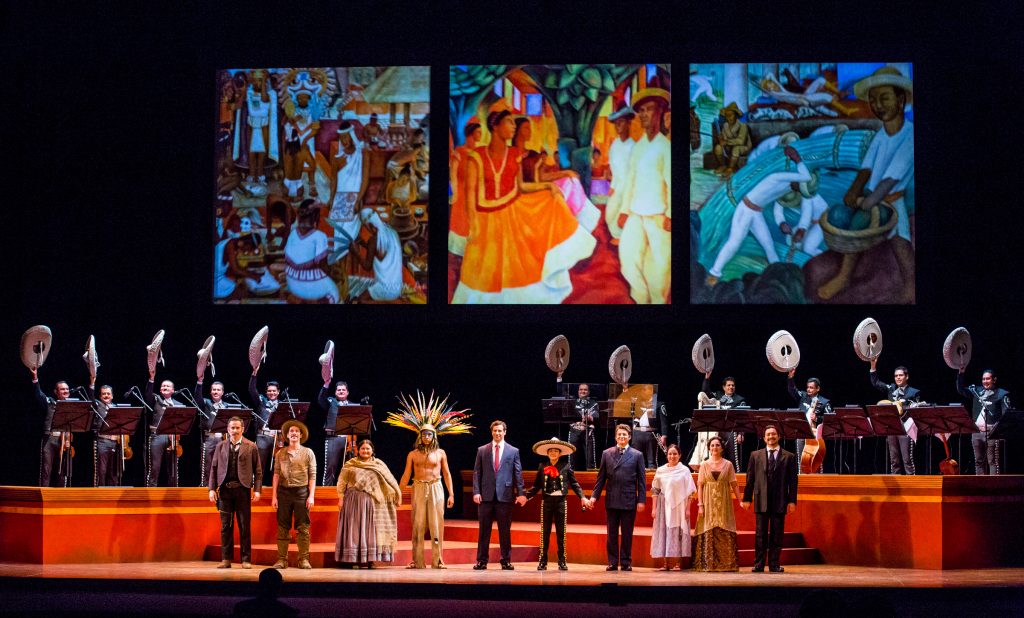Not Perfect but Plenty Powerful
Standing above and behind the stage action, the orchestra – six violins, two trumpets, harp, guitar, vihuela and guitarrón – plays an indispensable role. Performing without a conductor, their musical rapport – with both the singers and each other – was impressive, propelling the action forward, creating atmosphere, and underlining the emotional transitions in the story.
Martinez’s music reaches for and, to its credit, often achieves moments of both power and ecstasy. The challenge of creating this kind of work in which colloquial forms once used primarily for dancing (repetitive by their very nature) are re-shaped into lyric forms for extended emotional expression is indeed a tricky one. Martinez succeeded in transcending the built-in constraints of a pre-existing aesthetic, liberating the conventional mariachi sound and sensibility to accommodate a more nuanced story-telling, sometimes using the music to carry the emotions of one scene into another as a kind of subdued counterpoint.
Foglia’s Spanish and English libretto achieved its impact and emotional punch from its directness and clarity. A tip of the hat to the sound designer (uncredited in the program), who achieved something rare: amplification that was restrained and clear, actually enhancing comprehension rather than defeating it.
The story of El Pasado Nunca Se Termina (The Past Is Never Finished) is almost un-operatic in its simplicity. In 1910 Mexico, on the eve of the Revolution, a young man (Luis, sung by tenor Daniel Montenegro) from a Creole family possessing power and privilege who is heir to a powerful hacienda (estate) owner, falls in love with an indigenous girl (Amorita, played by Abigail Santos Villalobos). On the night of their meeting, Halley’s Comet crosses the sky, signaling that the fate of their love will be framed by destiny and determined by the forces of conquest and oppression that have shaped the world they live in.
In short, succinct scenes, they – and we – soon face the fundamental questions that propel the action of the opera: Who are we? Where do we fit in the universe? How can we know where we belong, and how we will be remembered? Can love cross barriers of time, space, class and war? Is the past ever really past?Ms. Villalobos possesses a creamy, focused soprano of great beauty, and she stood at the apex of a cast of singing actors who had benefited from Mr. Foglia’s pointed, economical direction, and whose wholehearted commitment to the music itself lifted the entire afternoon to a special level. Mr. Montenegro managed the tricky task of playing the young aristocrat without a trace of arrogance.
As Juana, Amorita’s mother, Vanessa Alonzo anchored the entire sound world of the piece with a voice that defies the usual operatic classifications. Her intense singing evoked things ancient, authentic, and vital, revealing the core of the music, less concerned with sound than with impact, which was considerable.
The 2:00 p.m. performance (the second was at 7:00 p.m.) was bedeviled by technical glitches, major and minor, including a gun that failed to fire at a crucial moment. As the curtain rose to reveal a simple scenic design backed by three arches framing a starry sky (scenic and projection design was by Elaine McCarthy), it dislodged a cable connecting the supertitles screen above the stage. For a production about to be sung and spoken in two languages, this was the kind of unforeseen accident that happens in stage managers’ nightmares.
Efforts to correct the situation (probably without really knowing what had happened) were unsuccessful, and, for a few minutes as the opera proceeded without break, there was a palpable air of unease among the audience.
Then something special happened. Maybe it was the energy of the music, maybe it was the sharpened focus of the performers as they began to realize that no matter what language they happened to be speaking or singing in, projecting the inner world and the shifting emotional landscape of the story was now more important than ever. And maybe it was because the audience, now deprived of the easy access into the plot and emotions usually provided by the supertitles, began to pay the kind of profound, intense attention so infrequently experienced today in large auditoriums.
At the end of the opera’s non-stop 90 minutes, the shouted acclaim of the audience for the performers left little doubt that what had at first appeared to be a potentially disastrous glitch had actually been an unexpected gift, one that had deepened El Pasado‘s meaning and intensified its emotional impact.
In a 50-year professional career, Marcus Overton has crossed disciplinary lines to work in theatre, opera, dance and broadcasting. Trained as an actor by Alvina Krause at Northwestern University, he made his professional debut in the title role of Shakespeare’s RICHARD III. Work as a director in both theatre and opera (Lyric Opera of Chicago, Chicago Opera Theatre, San Diego Opera) followed, as well as administrative positions at the Ravinia Festival, the Smithsonian Institution’s performing arts program, and the general manager’s post at Charleston’s Spoleto Festival USA. On South Carolina’s famed ETV radio network, he has been producer and host of Spoleto Today for 20 years, as well as an Emmy Award-winning producer of six television specials about the Festival. He is currently a Consultant for Special Projects at the La Jolla Music Society.


![Abagail Santos Villalobos & Daniel Montenegro El Pasado Nunca Se Termina by José "Pepe" Martínez and Leonard Foglia Mariachi Vargas de Tecalitlán. Santos & Villalobos Montenegro [photo © Todd Rosenberg Photography 2015]](http://www.sandiegostory.com/wp-content/uploads/2015/05/05_Santos_Villalobos_Montenegro_EL_PASADO_LYR150328_241_cTodd_Rosenberg-1024x683.jpg)